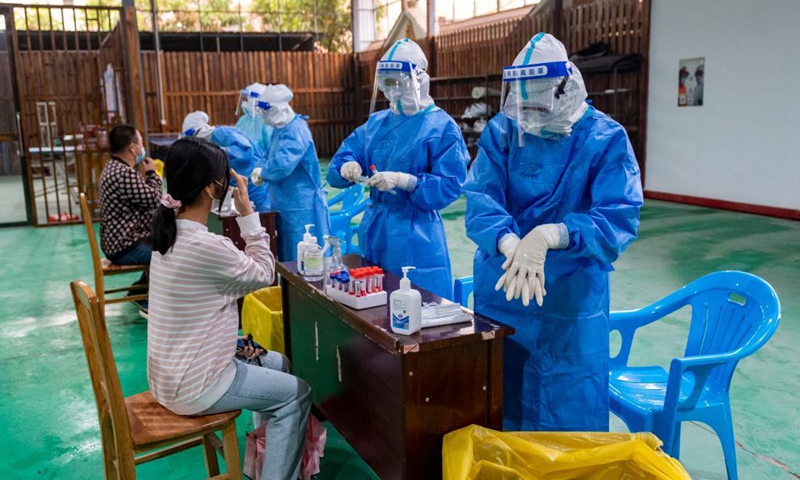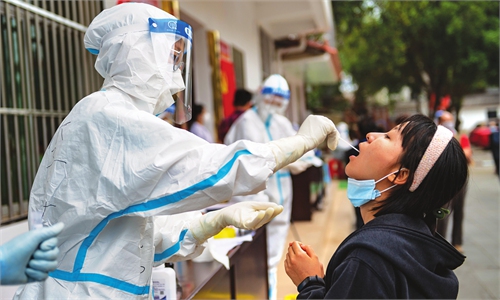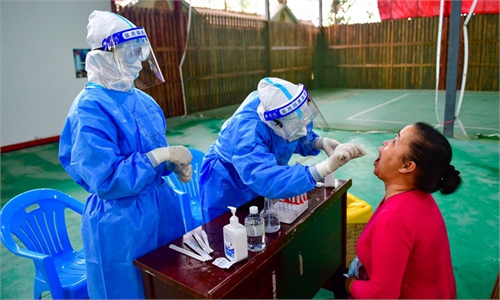
Ruili port in Southwest China's Yunnan Province links the country with Myanmar. Photo: VCG
Many traders in Ruili, a city in Southwest China's Yunnan Province bordering Myanmar, are worried about their businesses after the city announced a third lockdown on Monday following the detection of three new domestic COVID-19 cases.
The new lockdown could add to lingering disruptions and impact on small businesses caused by epidemic prevention and control measures that have been in place for months to stem the spread of the COVID-19, according to local merchants.
Jiegao port in Ruili has been closed since COVID-19 flare-ups in March, prohibiting the movement of people and vehicles, a local government official surnamed Yue, who is in charge media relations, told the Global Times on Monday.
Another port - Wanding, a town bordering China and Myanmar - also banned the exit of Chinese vehicles from the country starting on June 22, according to a notice issued by the epidemic prevention and control office in the Wanding economic development zone, which asked for the understanding and support of local traders and merchants.
The previous coronavirus outbreaks already dealt a blow to Ruili. The city closed the jade trade fair and suspended imports of jade from Myanmar, a major business in the city, starting from March.

A resident receives nucleic acid testing for COVID-19 at Munao community, Ruili City, southwest China's Yunnan Province, April 6, 2021. Ruili City in southwest China's Yunnan Province on Tuesday launched the second round of nucleic acid testing that includes all residents of the city proper. (Xinhua)
Now, the new outbreak has made local businessmen feel more worried."The jade trade was halted over the past months. We are not allowed to sell jade through livestreaming or import jade from Myanmar, due to the epidemic prevention and control measures," Wei Lin, a jade merchant in Ruili, told the Global Times on Monday.
Though he started to sell fruit on e-commerce platforms to cushion the impact on his business, Wei regarded the current earnings as "chicken feed" compared with the loss of 50,000-100,000 yuan ($7,738-15,475) per month.
According to local residents, Myanmar mainly exported wood, fruit and agricultural products to China via the ports in Ruili, while China exports daily necessities including clothes, electronics and motorcycles to Myanmar.
"We dare not to take any more orders from Myanmar now," Peng Huimin, a manager at Ruili Huihao import and Export Co, told the Global Times on Monday.
Peng said that the company used to import agricultural products from Myanmar and export machinery, but since the outbreak worsened in Myanmar in May 2020, the company's imports from the Southeast Asian country dropped to only several hundred tons from a peak of about 10,000 tons annually.
"The freight cost has become too high due to the closure of some ports, while there are risks that imports could be delayed due to traffic jams and strict inspection at ports," he said.
Peng said that the company only exported a small amount of medical supplies such as nucleic acid test kits to Myanmar since this April, but the exports may be suspended if there is another resurgence of the virus and all the ports are shut down.
Even though the virus has hit the city multiple times and many small businesses have been affected, bilateral trade value between China and Myanmar saw year-on-year growth this year, though the growth rate dropped each month.
China's exports to Myanmar grew 43.1 percent year-on-year in January, but dropped 6.1 percent in May, statistics from Chinese customs showed. Its imports from Myanmar increased 54.2 percent year-on-year in January, but were down to an increase of 39.3 percent in May.
In the second half of the year, bilateral trade still faces great uncertainties, analysts said.
"The recovery of bilateral trade depends on the epidemic control in Myanmar as the country is suffering from the Delta variant of the COVID virus," Guo Jiguang, an associate researcher at the National Institute of International Strategy of Chinese Academy of Social Sciences, told the Global Times on Monday.
Guo also noted that the epidemic prevention and control work at Chinese borders still remains heavy and significant, though China has abundant experience in fighting viral flare-ups.




